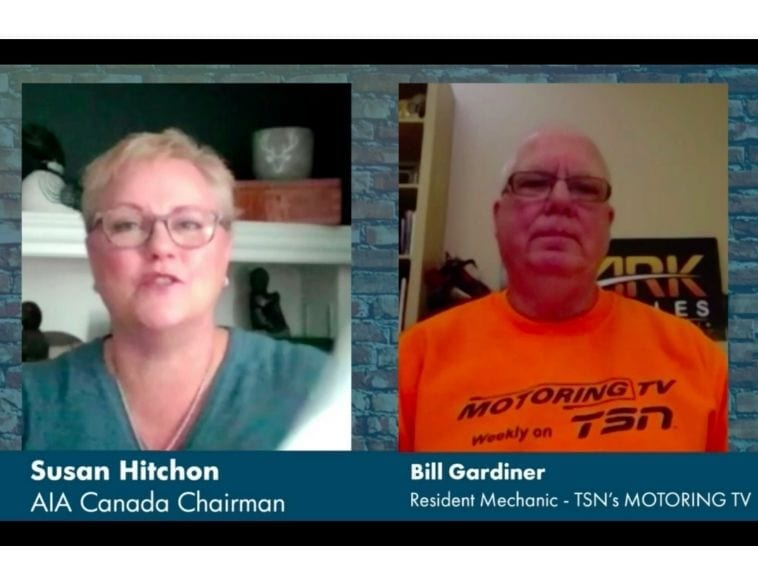To conclude its 2020 web discussion series, AIA Canada invited automotive “Doctor” Bill Gardiner.
With 45 years of experience in car care and a guest expert on TSN’s Motoring TV, Gardiner had more than one anecdote to share with Susan Hitchon, President of the Board of AIA Canada.
Working seven days a week during peak periods at his Mississauga, Ontario workshop, the experienced man was comfortable answering Hitchon’s questions and those of the online participants.
Keeping Cars Long
One of the issues most often raised on his TV shows and at the counter in his shop is related to rust proofing treatments. This is obviously something he strongly advises his customers since he has seen, over the years, that people are going to get rid of cars whose appearance has deteriorated even though their mechanical condition is still very acceptable. “Consumers are going to want to keep their vehicle even if it looks good when it’s 10 or 12 years old,” he says. “For the aftermarket, it’s a good deal.”
He validated the technology of electronic rust prevention, which in the end would not be adapted to the automotive field. He prefers to recommend regular conventional treatment.
Gardiner notes that cars will often delay basic maintenance. “They need to be informed and accompanied,” he advises. “We need to build relationships with these customers, who often come to us after a visit to their dealer that leaves them skeptical. The point of discussion remains the manufacturer’s recommendations, taking into account our difficult conditions in Canada.”
For him, the development of this bond of trust is built as soon as the customer changes vehicles. It is important to explain how this model differs from the previous one and to highlight the points to be kept in mind. They need to be prepared for what will come next. The important thing, according to Gardiner, is to give them confidence and put them in mind that you are able to maintain their new acquisition.
“Some Toronto-area dealerships offer light maintenance seven days a week,” says Gardiner. That puts a lot of pressure on aftermarket shops who also have to demonstrate their availability for fear of losing some of their customer bases.
New Technologies
The arrival of new technologies, particularly in the area of Advanced Driver Assistance Systems (ADAS), is also blurring the picture. Gardiner admits that he relies on trusted partners for calibration and reprogramming. “The aftermarket workshops are a community of specialists who can and should help each other. You have to stop seeing each other as competitors and build alliances. There is a network being built in our region. Specialized workshops on a brand, which has the tools and knowledge to work on that manufacturer’s ADAS systems, can complement our work. In this sense, it’s remarkable to see how much mechanics like to share their knowledge.”
It was also interesting to hear Gardiner say that he understands that a certain clientele wants to entrust their maintenance to dealers. “As far as I’m concerned, if the dealer offers an unbeatable discount on an oil change, I’m not going to discourage them from going. However, for everything else, the consumer is better off going to an independent shop.”
Working the Base
What customers want is quality work, but also at a good price. That’s where Gardiner says the aftermarket shops are doing well. Everybody would like genuine parts for their car, but at some point, it’s just too expensive,” he says. Offering quality aftermarket parts is the best approach to ensure a good customer will keep their car longer.
Susan Hitchon asked Bill Gardiner what he thought was the key to success for an independent shop. “It’s all about the quality of the relationship,” he said. “A satisfied customer will tell his family, co-workers and friends. I always recommend working on our base of good customers. That’s probably why I’ve never been short of work.’’



